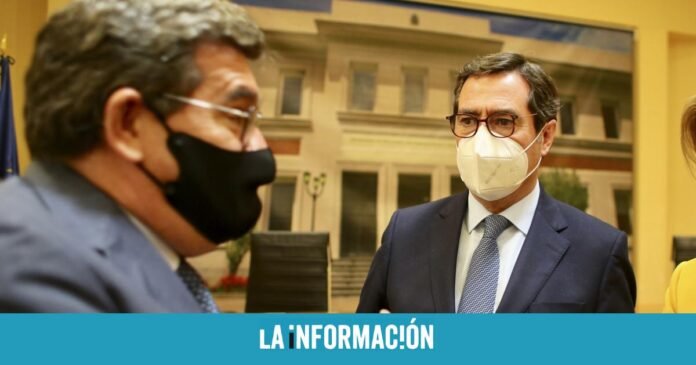At this point in the year, the Government takes it for granted that it will not be able to close an agreement at the social dialogue table on the second part of the pension reform before December 31, as it has promised with the European Commission. However, government sources assured that the deadlines agreed with Brussels are “flexible” and that the negotiation with the social agents could be extended during the first weeks of next year in order to reach an agreement. And in this context, the Minister of Inclusion, Social Security and Migration, José Luis Escrivá, would be willing to modulate his proposal to attract the CEOE, which is the party that is showing the most reluctance.
This is confirmed by sources aware of the negotiations that are being held these days behind the scenes, discreetly. “There are no formal meetings called, but the contacts are constant,” they insist from within the social dialogue. “To all bands”, they clinch. The latest official proposal from the Ministry did not convince either the employers or the unions, but it is the employers who are “tightening the rope”, according to these sources, despite the fact that they made the decision to distance themselves from this block of the reform of the pensions “a long time ago”. In the Government they interpret that this negotiating strategy is part of the “usual staging to which the employers have accustomed us.”
It must be remembered that, in the last draft sent to the dialogue table, the Security of contributions, as well as the approach to increase the maximum contribution bases by 30%, while the highest pensions are raised by 3%. The employer rejects both measures because it considers that they represent a cut in rights and an increase in labor costs and violate the principles of contribution and intergenerational equity. The unions, for their part, reject the extension of the computation period, because they also suspect that it will reduce pensions, and they are betting on the total uncapping of contributions.
But the real clash is with the CEOE, as confirmed by various sources of social dialogue. The Ministry has reproached Antonio Garamendi for not making proposals to the negotiating table, as has happened on previous occasions, and Escrivá suspects that the employers had decided that they would not join this pension agreement for some time. Government sources reject that the rupture of the dialogue with the Ministry of Labor on account of the amendment that Vice President Yolanda Díaz agreed with EH Bildu to increase control of the inspection over the ERE is canceled due to the climate of the pensions table, but acknowledges that The atmosphere in general is “tense” with the CEOE and it will be difficult for it to be fixed before the end of the year, given that there is barely a week left.
In this context, the sources consulted within the Government already take it for granted that, according to the social dialogue table, 2023 will already be entered. “The ideal would be to close it during the month of January, to start the processing in February “, they indicate. Asked about a possible penalization of the European authorities for skipping the deadlines committed in the Recovery Plan -the second block of pension reforms has a deadline set for December 31- Executive sources assure that “there is no problem “and they remember the precedent of the reform of the contribution system for self-employed workers, which was closed later than promised. “Likewise, the Commission will not begin to evaluate the reforms of this part of the Plan until February, that is, we have a margin,” the government insists.
Escrivá is aware that it must compensate for the linking of pensions to inflation and the repeal of the revaluation index and the sustainability factor of the previous PP reform with measures both on the revenue and expense side. In the first part of the reform, he already presented advances in this regard in the incentives to prolong the retirement age and in the penalties for early retirement, as well as in the new contribution system for the self-employed. He now intends to continue compensating with the extension of the computation period and with the increase in the maximum contribution bases. But Brussels has already announced that it is not enough and it will have to extend the validity of the Intergenerational Equity Mechanism (the extra contribution of 0.6 points) until 2050.
On this last point, at the social dialogue table it is already taken for granted that the Government will prolong the validity of the MEI to prop up collection, although the Ministry still states that it has not done so officially. According to sources familiar with Escrivá’s intentions, the minister plans to come to the table at the last moment. Before, he would be willing, according to these sources, to “modulate” his proposals both in terms of extending the calculation period and in reference to raising prices to attract businessmen to the agreement. “There is still room to lower the calculation period and the maximum bases can also be touched,” he assures. Everything, to convince the CEOE, since the Ministry is willing to close an agreement only with the unions if the employers castle.

